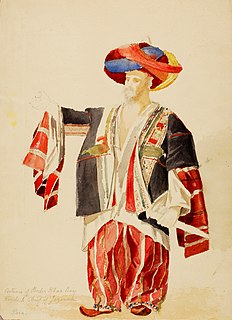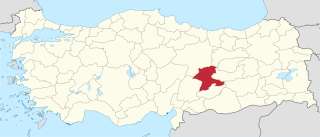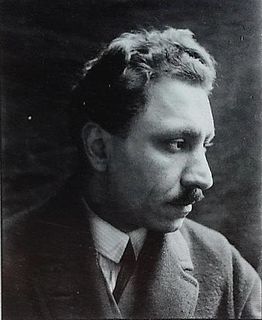
Bedir Khan Beg was the last Kurdish Mîr and mütesellim of the Emirate of Botan.

Malatya Province is a province of Turkey. It is part of a larger mountainous area. The capital of the province is Malatya. Malatya is famous for its apricots. The area of Malatya province is 12,313 km². Malatya Province had a population of 853,658 according to the results of 2000 census, whereas in 2010 it had a population of 740,643. The provincial center, the city of Malatya, has a population of 426,381 (2010).

Celadet Bedir Khan or Celadet Bedirkhan, also known as Mîr Celadet, was a Kurdish diplomat, writer, linguist, journalist and political activist. He held a master's degree in law from Istanbul University, completed his studies in Munich, and spoke several languages including Arabic, Kurdish, Russian, German, Turkish, Persian and French. He left Turkey in 1923 when the Kemalists declared a new republic. In 1927, at a Kurdish conference held in Beirut, a committee was formed, the Xoybûn. He is known for having been the first modern linguist to compile and organise the grammar of the modern form of the Northern Kurdish language, Kurmanji, and having designed the Latin-based Hawar alphabet, which is now the formal alphabet of Kurmanji and is also frequently used for the other dialects of the Kurdish Language, having replaced the Arabic-based, Cyrillic-based, Persian-based and Armenian-based alphabets formerly used for Kurmanji.

Xoybûn or Khoyboun was a nationalist organisation of Kurds that is known for leading the Ararat rebellion, commanded by Ihsan Nuri. Many Armenians joined the movement as well.
Qedrîcan or Qedrîcan, Abdulkadir Can (1911–1972) was a Kurdish poet, writer and translator. He was born in Derik, a small village. At a time when schooling was the subject of jokes and when few people studied Qedrîcan's father, known as "Cano" sent him to school. He was a very successful student, especially in the areas of science and mathematics. Seeing that his son was a successful student Cano decided to send his son to Konya to study at the teachers' college there. During his days as a student there Qedrî Can was blacklisted for cultivating "political strife"; he was made a target for writing poetry in Kurdish and was forced to escape Turkey. At a time after the defeat of the Sheikh Said Rebellion, he escaped to Syria and lived in Damascus until his death in 1972.

Kurdistan was the first Kurdish newspaper. It was first published on April 22, 1898 in Cairo, Egypt by Mikdad Midhad Bedir Khan, a member of the Kürdistan Teali Cemiyeti. In four years, 31 issues were printed in cities as Cairo, Geneva, London and Folkestone. It was an opposition newspaper published in exile and supported by the Committee of Union and Progress and was published in Constantinople after the Young Turk revolution in 1908. In 1914, during World War I, the newspaper returned to Cairo. Its first issues were published solely in Kurmanji, but from the 4th issue some texts in Turkish were also published. The newspaper was distributed for free. From its 6th issue the newspaper was published in Geneva, and edited by Abdurrahman Bedir Khan, Mikdads brother who had close ties to Abdullah Cevdet and İshak Sükuti, both editors of the Osmanli and founders of co-founders of Committee of Union and Progress. The newspaper published several articles that were critical to the government of Sultan Abdul Hamid II. It got banned in the Ottoman Empire and had to be smuggled in. According to the letters to the editor it had readers in cities as Adana, Damascus, Mardin and Diyarbakır. It published articles concerning Kurdish History and literature and the opposition to Abdul Hamid II. One of its first issues included a call in Turkish language to Abdul Hamid for that its distribution shall be allowed in the Kurdish provinces arguing that the illiteracy of the Kurds was a reason for the backwardness of the Kurds but as well for the foreign powers to intervene in the region. In 1918, the newspaper was published by the son of Emin Ali Bedirkhan, Süreyya Bedir Khan. In 1991, the scholar Emin Bozarslan re-published and translated a collection of its suites into Modern Turkish.
Kamran is a Persian given name commonly used in Iran, Pakistan, Turkey and Azerbaijan. Kamran means 'prosperous' in Persian.

Bohtan was a medieval Kurdish principality in the Ottoman Empire centered on the town of Jazirah ibn 'Omar in southeastern Anatolia. Bohtanis were an ancient and prominent branch of the Kurds that claimed descent from the Islamic General and Sahaba Khalid ibn al-Walid. Some minor branches followed Yazidism but Sunni Islam predominated in the 14th century.
Society for the Rise of Kurdistan also known as the Society for the Advancement of Kurdistan (SAK), was secretly established in Constantinople on 6th November 1917 and officially announced organization formed on the 17 December 1918. It was headquartered in Istanbul, with the aim of creating an independent Kurdish state in eastern Turkey. The Society based its statements for an independent or autonomous Kurdistan on the Treaty of Sèvres and the Fourteen Points stipulated by Woodrow Wilson. The society formed many local dependencies in the eastern provinces of Turkey.

The Emirate of Hakkâri was a Kurdish emirate in present-day southeastern Turkey, centered on the city of Hakkâri, and to the west of Lake Urmia on the border with Iran, which ruled a wide variety of peoples.

Kamuran Ali Bedirxan was a Kurdish politician, lawyer and writer.

Nûredin Zaza was a Kurdish politician, writer and poet. Zaza was a co-founder of the Kurdistan Democratic Party of Syria and a founding member of the Kurdish Institute of Paris.

Emin Ali Bedir Khan was a founding member of the Kurd Society for Cooperation and Progress and vice president of the Society for the Elevation of Kurdistan and Kurdish politician.
Leyla Bedir Khan was a ballet dancer and a Kurdish princess of the Bedir Khan family.

Süreyya Bedir Khan was a Kurdish prince, a descendant of Bedir Khan Beg and a member of the Bedir Khan family. He was an influent supporter of Kurdish independence, a journalist and author of several books. He works also known under his pen-name Bletch Chirguh.
Abdürrezzak Bedir Khan was an Ottoman diplomat, Kurdish politician and a member of the Bedir Khan family.
Bedri Pasha Bedir Khan was a Kurdish Ottoman politician and a member of the Bedir Khan family.








